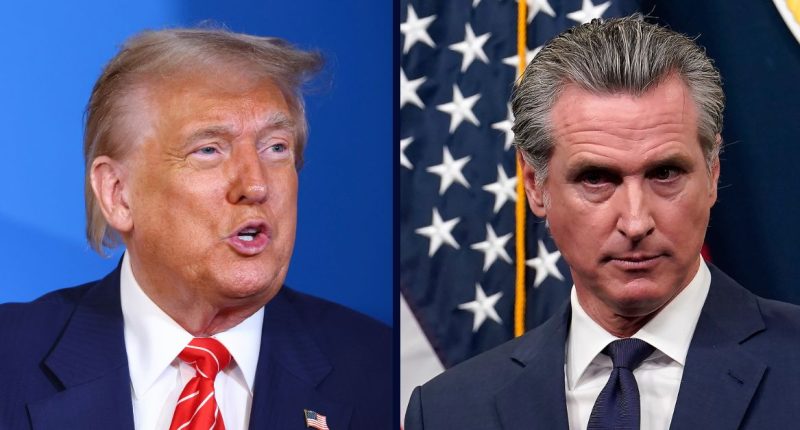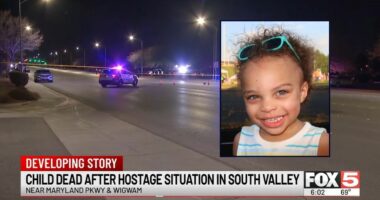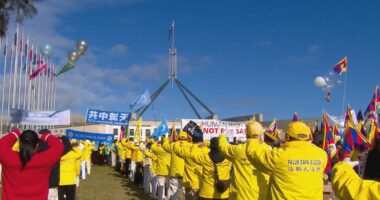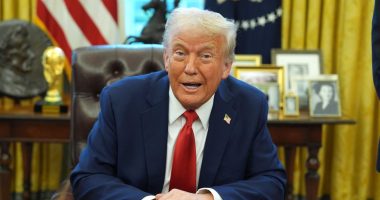Share this @internewscast.com
Left: President Donald Trump addresses reporters during a meeting with NATO Secretary General Mark Rutte as he arrives for a NATO summit in The Hague, Netherlands, on Wednesday, June 25, 2025 (Piroschka Van De Wouw, Pool Photo via AP). Right: Calif. Gov. Gavin Newsom unveils his updated state budget at a press conference in Sacramento, Calif., on Wednesday, May 14, 2025 (Photo/Rich Pedroncelli/AP).
Following a request from one judge on the 9th U.S. Circuit Court of Appeals for a vote among peers on whether the entire court should reconsider a previous ruling that favored President Donald Trump’s decision to federalize the National Guard in Los Angeles, the Trump administration has pointed out that there’s no need for further review. They argue that the lack of a request for reevaluation from California itself is evidence enough.
A week after the single 9th Circuit judge called for a vote, both the Department of Justice and the California Attorney General’s Office submitted their responses as instructed. They presented their reasons for and against an en banc rehearing concerning Trump’s authority to deploy California’s National Guard as he did.
In mid-June, U.S. Circuit Judges Mark Bennett and Eric Miller, both Trump appointees, and Jennifer Sung, a Joe Biden appointee, agreed that the Trump administration made a “strong showing that they are likely to succeed on the merits of their appeal.” The three-judge panel then unanimously stayed U.S. District Judge Charles Breyer’s temporary restraining order, an order that had concluded Trump exceeded his statutory authority and violated the 10th Amendment.
The panel wrote that it was “likely” Trump “lawfully” deployed the National Guard to “protect federal personnel performing federal functions and to protect federal property” amid civil unrest or, as the administration put it, “rebellion” over ICE raids. The panel also said it “must be highly deferential” to Trump, even though his invocation of 10 U.S. Code § 12406, the federal statute that allows the president to call up the National Guard, isn’t “completely insulated from judicial review.”
Trump’s DOJ has now pushed back, saying it was telling that California itself didn’t seek an en banc rehearing even as the state framed the federalization of its National Guard in increasingly dire terms.
“California’s own litigation decisions confirm that rehearing en banc is unwarranted,” the filing said, noting that “merits briefing is already underway” in Breyer’s court.
Breyer over the weekend set a series of deadlines through the end of July and into mid-August in anticipation of a bench trial. Those deadlines pertain to discovery, witness lists, depositions, motions in limine, stipulations of fact and conclusions of law, and arguments for and against a preliminary injunction.
The DOJ said there’s no reason for the 9th Circuit to throw a wrench into the schedule and that California should not be rewarded for its inaction in court.
“Were there any doubt that en banc rehearing is unwarranted, it is confirmed by California’s failure to request it in the three weeks following the panel’s stay ruling,” the filing continued. “En banc review of an interlocutory stay decision is extremely unusual, and granting such review without a request, while the parties are simultaneously briefing the merits, would be unprecedented.”
If the 9th Circuit ordered a rehearing, the DOJ said, then expect the Trump administration to sprint to the U.S. Supreme Court for “emergency relief.”
“The American adversarial system relies on the parties to seek the relief to which they believe they are entitled, and California did not seek en banc review here,” the DOJ concluded. “Second-guessing that choice now, while the parties are already briefing the merits of the appeal, could lead to a series of conflicting decisions — and it would inevitably prompt the government to seek emergency relief in the Supreme Court to ensure the President’s uninterrupted ability to enforce federal law.”
In a footnote, the DOJ also cited to a New York Times article and suggested that the 9th Circuit “take judicial notice of the fact” that the Trump administration “recently ordered the release of nearly 2,000 members of the California National Guard.”
AG Rob Bonta, representing Gov. Gavin Newsom, countered the DOJ by asserting it was “normal” that California had not yet filed a petition for an en banc rehearing — even as the state maintains Trump’s “unprecedented actions” amount to a “dangerous experiment” with potential far-reaching consequences within the 9th Circuit’s jurisdiction should the panel’s ruling remain “precedential.”
“In the normal course, a petition for rehearing en banc would have been due on August 4, 2025,” Bonta argued. “On July 11, ahead of that deadline, the Court sensibly ordered the parties to file briefs addressing whether the panel’s stay order should be reheard en banc. It should.”
“The panel rightly rejected some of defendants’ most extreme legal theories, like their contention that the federalization order is entirely unreviewable. But the panel’s precedential opinion adopts an expansive interpretation of Section 12406(3) that sorely misunderstands the relevant text, history, and precedent,” said the state.
If the panel’s “flawed” decision remains in place, Bonta warned, its interpretation of 10 U.S. Code § 12406 “will apply anywhere in the Ninth Circuit where defendants decide to repeat this dangerous experiment,” where a president’s “‘mere dissatisfaction’ with the effectiveness of federal law enforcement” can “make it all too easy” for the executive to deploy the National Guard on the streets of American cities — perhaps even around election time.
“Giving the President authority to federalize the Guard in those circumstances would make it all too easy to deploy thousands of military troops to American communities—not just where civilians are protesting immigration enforcement, but also where they are protesting other policies, or protesting in advance of a federal election,” the state argued. “En banc review is warranted to prevent that ‘untenable and dangerous’ scenario from materializing.”
In closing, Newsom’s legal team insisted that normalizing Trump’s order poses a “grave danger that the public will become accustomed to this unprecedented intrusion of the military into civilian life.”
“As a result, important First Amendment freedoms will be chilled,” the brief said. “The States’ sovereign authority over their militias will be compromised. And the federal executive will amass authority that our Framers never contemplated.”
















